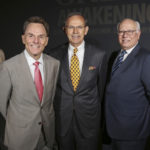KANSAS CITY, Mo. (BNG)—Southern Baptist Convention President Ronnie Floyd suggested merger of the convention’s two mission boards during a symposium on the denomination’s future at Midwestern Baptist Theological Seminary in Kansas City, Mo.
 Ronnie Floyd“Structures and systems flow from the work of God,” Floyd, senior pastor of Cross Church in Northwest Arkansas, told denominational leaders at the first installment of a new series of meetings to be held once every three years. “They do not create the work of God.”
Ronnie Floyd“Structures and systems flow from the work of God,” Floyd, senior pastor of Cross Church in Northwest Arkansas, told denominational leaders at the first installment of a new series of meetings to be held once every three years. “They do not create the work of God.”
“If we hold on to our old structures and systems—more concerned about preserving them than seeing them conformed to what God is doing today—then we may lose both the work of God and this present generation of Baptists,” Floyd said three months into his second and final one-year presidential team.
Floyd, a pastor 39 years, said the stakes are high for the denomination’s future.
“In 1845, we were founded with a great purpose and vision to reach the world for Christ,” he said. “As we have grown in our organization, we have also grown in our complexity.”
“If this continues, our central focus will become the preservation of our structures and systems—the budget and the allocation of it to our ministries—rather than keeping our focus on our mission to reach the world,” he said.
‘Strategic reinvention’
Floyd, a member of two panels in the last 20 years to reorganize and reprioritize the nation’s second-largest faith group and chair of the “Great Commission Resurgence” task force that brought recommendations approved in 2010, said for the purposes of his assignment, he was presenting his observations about spiritual renewal and “strategic reinvention” of the SBC as questions, even though he has an opinion about most of them.
One question—“For the sake of gospel advancement, should the International Mission Board and the North American Mission Board become one mission board?”—prompted bloggers who attended to weigh in with both pros and cons.
Sign up for our weekly edition and get all our headlines in your inbox on Thursdays
In video of the message recently made available online, Floyd said the question is one the next generation of Southern Baptist leaders will address.
“This is not a new question at all,” he said. “Some of us who have been involved in shaping the future have asked this question and tried to answer it honestly. With our present matters at hand, this question is being asked more today than ever before.”
Floyd suggested three factors that previously prevented Southern Baptists from having just a single mission board:
• Unique roles of each mission board. “While this has been true before, is it still true within the global culture we experience daily and with the reality the ethnicities that live everywhere across this world?” he asked.
“Is this true when technology is helping shape the culture today and can assist us in our mission? Furthermore, with an undeniable global mindset in America today, is this still the right strategy?”
• Cooperative Program dollars would be held mostly by one board instead of two. At present, merger would mean 73 percent of the SBC portion of the Cooperative Program unified budget—more than $137 million—would be controlled by one board of trustees.
“Is this really problematic when the board of trustees is responsible to the convention for the fiduciary responsibilities of our entities?” Floyd asked. “Is this really a viable reason why this should remain as our strategy? I wonder what our churches think.”
• The timing never has been right. “Only God knows the time,” Floyd said. The real question about the future of the SBC’s two mission boards is “which decision will fast-forward the mission of our churches to advance the gospel of Jesus Christ to the ethnicities of the world.”
“This generation of Baptists will have to determine how to answer this question,” he said.
On another topic, whether there is a future for state conventions and local associations, Floyd said, if the SBC were being built from the ground up today, there would be a need for boots on the ground to help churches achieve their mission.
“If we operated from a clean slate today, perhaps it may look somewhat different, but the key reality for the future would be more their function than in the structure,” Floyd said.
State conventions and associations
For state conventions and associations to be relevant in the future, the key is to clarify their mission and simplify their responsibilities, he said.
“They do not need to duplicate and triplicate one another, nor do our national entities need to do that,” he said. “We must find a way to cease duplication and triplication locally, statewide and nationally.”
State and local Baptist groups must “be agile in their response to the churches,” Floyd said.
“Weighty, needless structure prohibits immediate response to the churches,” he said. “We need to rid anything in our state conventions, anything in our associations and even our national entities that slows down our responsiveness to the churches.”
In terms of sustaining themselves financially, Floyd said, any organization that cannot raise enough money to support itself should be questioned about whether it is truly needed.
For example, Floyd said, some state conventions and local associations might consider “merging for the greater cause of helping our churches more effectively.”














We seek to connect God’s story and God’s people around the world. To learn more about God’s story, click here.
Send comments and feedback to Eric Black, our editor. For comments to be published, please specify “letter to the editor.” Maximum length for publication is 300 words.